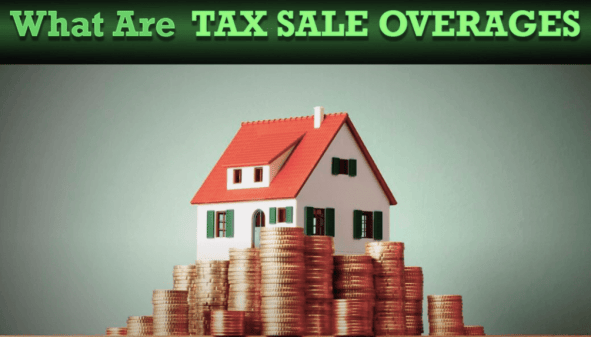All Categories
Featured
Table of Contents
Many of those homeowners really did not even know what excess were or that they were even owed any kind of surplus funds at all. When a property owner is incapable to pay building taxes on their home, they may lose their home in what is recognized as a tax obligation sale auction or a sheriff's sale.
At a tax sale auction, buildings are sold to the highest possible prospective buyer, nonetheless, in some situations, a residential property might cost greater than what was owed to the area, which leads to what are called surplus funds or tax obligation sale overages. Tax obligation sale overages are the added cash left over when a foreclosed property is offered at a tax sale auction for even more than the amount of back tax obligations owed on the property.
If the building costs even more than the opening quote, after that overages will certainly be produced. Nevertheless, what many property owners do not know is that several states do not enable counties to keep this money for themselves. Some state laws dictate that excess funds can just be declared by a few events - consisting of the individual that owed tax obligations on the home at the time of the sale.
If the previous homeowner owes $1,000.00 in back tax obligations, and the residential property sells for $100,000.00 at public auction, after that the law specifies that the previous homeowner is owed the difference of $99,000.00. The area does not get to keep unclaimed tax obligation overages unless the funds are still not declared after 5 years.
Trusted Overages Surplus Funds Program Tax And Mortgage Overages
The notification will normally be mailed to the address of the residential property that was offered, however given that the previous home proprietor no much longer lives at that address, they often do not get this notice unless their mail was being forwarded. If you remain in this situation, don't allow the government maintain cash that you are qualified to.

Every now and after that, I listen to talk concerning a "secret new chance" in the organization of (a.k.a, "excess earnings," "overbids," "tax sale excess," and so on). If you're completely strange with this idea, I wish to provide you a quick review of what's taking place below. When a homeowner quits paying their residential property taxes, the regional district (i.e., the region) will await a time prior to they confiscate the residential or commercial property in foreclosure and offer it at their annual tax obligation sale auction.
The details in this short article can be influenced by numerous special variables. Suppose you have a building worth $100,000.
Five-Star Tax Sale Overage Recovery Blueprint Tax And Mortgage Overages

At the time of foreclosure, you owe about to the area. A few months later, the region brings this building to their annual tax obligation sale. Below, they sell your building (together with dozens of various other overdue properties) to the greatest bidderall to redeem their shed tax income on each parcel.
This is due to the fact that it's the minimum they will need to redeem the cash that you owed them. Right here's things: Your property is conveniently worth $100,000. The majority of the investors bidding process on your residential property are totally conscious of this, too. In lots of cases, residential or commercial properties like your own will certainly receive proposals FAR past the amount of back taxes really owed.
However obtain this: the region only needed $18,000 out of this home. The margin between the $18,000 they required and the $40,000 they obtained is referred to as "excess earnings" (i.e., "tax obligation sales excess," "overbid," "surplus," etc). Many states have laws that ban the area from maintaining the excess repayment for these residential or commercial properties.
The area has regulations in place where these excess proceeds can be asserted by their rightful owner, generally for an assigned period (which differs from state to state). If you shed your residential or commercial property to tax repossession due to the fact that you owed taxesand if that residential property consequently marketed at the tax obligation sale auction for over this amountyou could probably go and collect the difference.
Custom Tax Sale Overage List Program How To Recover Tax Sale Overages
This includes showing you were the previous proprietor, completing some documentation, and awaiting the funds to be provided. For the ordinary individual who paid complete market price for their property, this technique doesn't make much feeling. If you have a severe amount of cash money spent right into a residential property, there's method way too much on the line to just "allow it go" on the off-chance that you can milk some extra squander of it.
With the investing strategy I use, I could acquire residential or commercial properties cost-free and clear for pennies on the dollar. When you can acquire a residential or commercial property for an extremely affordable price AND you know it's worth considerably even more than you paid for it, it might really well make sense for you to "roll the dice" and try to gather the excess earnings that the tax obligation foreclosure and public auction procedure generate.
Reliable Real Estate Overages Education Property Tax Overages
While it can definitely turn out similar to the method I have actually defined it above, there are additionally a couple of downsides to the excess earnings approach you really ought to recognize. Tax Foreclosure Overages. While it depends considerably on the attributes of the residential property, it is (and in many cases, likely) that there will certainly be no excess profits created at the tax obligation sale public auction
Or maybe the county does not produce much public interest in their auctions. Either way, if you're getting a property with the of letting it go to tax obligation foreclosure so you can gather your excess earnings, what if that cash never ever comes through?
The very first time I sought this approach in my home state, I was told that I really did not have the alternative of declaring the surplus funds that were generated from the sale of my propertybecause my state didn't allow it (Foreclosure Overages List). In states like this, when they create a tax obligation sale overage at a public auction, They simply keep it! If you're thinking about utilizing this technique in your service, you'll intend to believe lengthy and tough concerning where you're working and whether their legislations and laws will certainly also permit you to do it
Sought-After Real Estate Overages Strategy Tax Overage Recovery Strategies
I did my finest to offer the appropriate answer for each state above, yet I 'd recommend that you before proceeding with the assumption that I'm 100% proper. Bear in mind, I am not an attorney or a CPA and I am not attempting to hand out professional lawful or tax obligation suggestions. Talk to your attorney or CPA prior to you act upon this info.
Latest Posts
Tax Ease Lien Investments
Tax Liens Near Me
Back Property Taxes